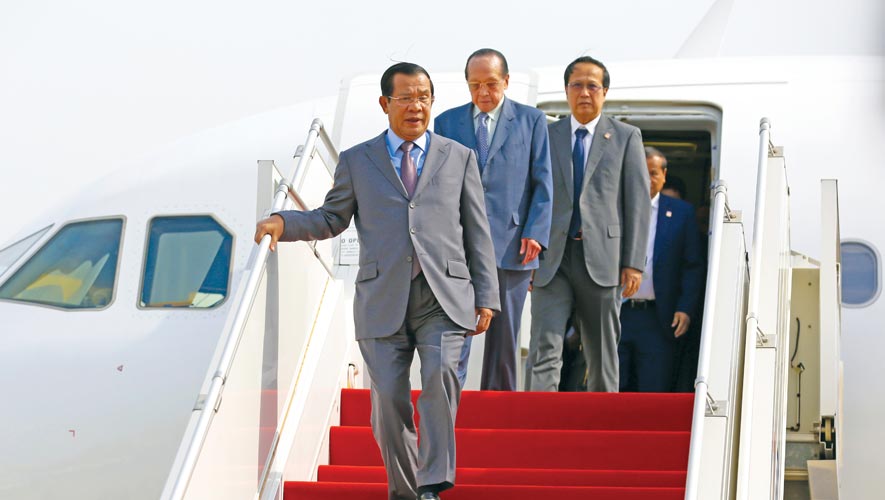Prime Minister Hun Sen on Friday says rice exporters should turn to China and Vietnam in an effort to diversify the export market from the European Union.
For the latest Cambodian Business news, visit Khmer Times Business
This comes in the wake of the EU invoking safeguards which limits exports of Cambodian rice to the EU due to flimsy complaints lodged by Spain and Italy on grounds that Cambodian rice exports, especially Jasmine rice to the EU, affect local producers of rice in these two countries.
The fact that the EU took this matter extremely serious is an understatement as tens of thousands of tonnes of Jasmine rice export to the EU market is now officially wiped out based on thin reasons that appear more political than trade protection.
That this comes in the wake of the EU putting Cambodia on notice for the possible revocation of the Everything but Arms trade benefits, which would affect 5.86 billion euros of trade as of 2017, seems to have gone unnoticed by the “bleeding hearts” in the EU and the world over purported violations carried in Cambodia.
While embarking on the safeguards on rice followed by threats to the sugar industry procedure to withdraw its trade preferences from the Kingdom it would seem that EU would have adopted double standards as Cambodia is concerned.
Although it is pointless to point out the numerous violations committed by neighbouring countries with whom the EU does business and seems determined to continue with “business as usual”, it does not seem to be the case in Cambodia where it is determined to impose its weaponised trade deal to ensure that EU’s relations with Cambodia is anything but “business unusual’.
Yes, Cambodia has weaknesses. Can the EU and US, which is also trying to pass legislations to remove her trade preferential deals with Cambodia, name one of their trading partners in Asia or Latin America or even in Europe who are not in violation of issues like human rights, freedom or rather “free damned” of expression and so forth? Unlikely. Particularly since the EU is determined to use the EBA as a potent weapon of “mass destruction” on Cambodia, and rice farmers, and the hundreds of thousands of garment and footwear workers who depend on this key pillar of the Cambodian economy for theirs and their family’s wellbeing and survival.
On whose conscience would this be laid? Do the US or EU even have a conscience for the wellbeing of the Cambodian people instead of the interest of one delusional political has-been?
The EU’s own chamber of commerce in Cambodia, Eurocham, as with the US chamber of commerce, Amcham, both seem to have adopted a position which is contrary to their countries confrontational dictatorial approach towards Cambodia.
They have outlined the gains made by Cambodia and have also made it abundantly clear on the losses and pain which could bear down on Cambodia and her citizens if the trade benefits were abolished.
It may be worth the while if both the EU and US take note of the fact that while removing trade benefits could be equated to trade sanctions, even if they choose not to say it, the possible debilitating effect of such a draconian action on Cambodia will not move democracy and human rights forward.
On the contrary, these may be rolled back as the people of Cambodia, while not necessarily all, love the premier, may actually hate the imposers of these sanctions even more as the trade bloc’s actions hurt their rice bowl and their income.
If the EU and US’ covert aim is to unleash economic hardship in the name of advancing democracy, freedom of expression and press freedom, are they prepared for the backlash of the Cambodian people when they realise that lesser of the two perceived evils is actually the premier and his government?
In the final analysis, trade benefits have become instruments of blackmail. Democracy in the Asian model is viewed as repulsive when larger trade volumes come into play and arbitrary punishment of 16 million Cambodian people for the unstated benefits of a single entity and a political has been become a priority.
Having said that, one wonders who would understand the Cambodian situation better? Trade organisations and chambers who live and conduct their business in Cambodia or the politicians who sit in the glass tower at Brussels and in Washington?
At what price? It is a black hole which cannot be quantified until the full effects are felt and as such, uncertain.
What is indeed certain is the fact that a sovereign country is being blackmailed, threatened and demonised by politicians in the “democratic” world for not adhering to their brand of freedom and democracy.
If it means no daily protests, armoured cars, snipers and violent confrontations, Cambodia would certainly be better off sticking to its guns and not be pushed into a corner like a wounded animal. We all know what happens when an animal is wounded and cornered at the same time. The events of seventies should serve as a stark reminder.




